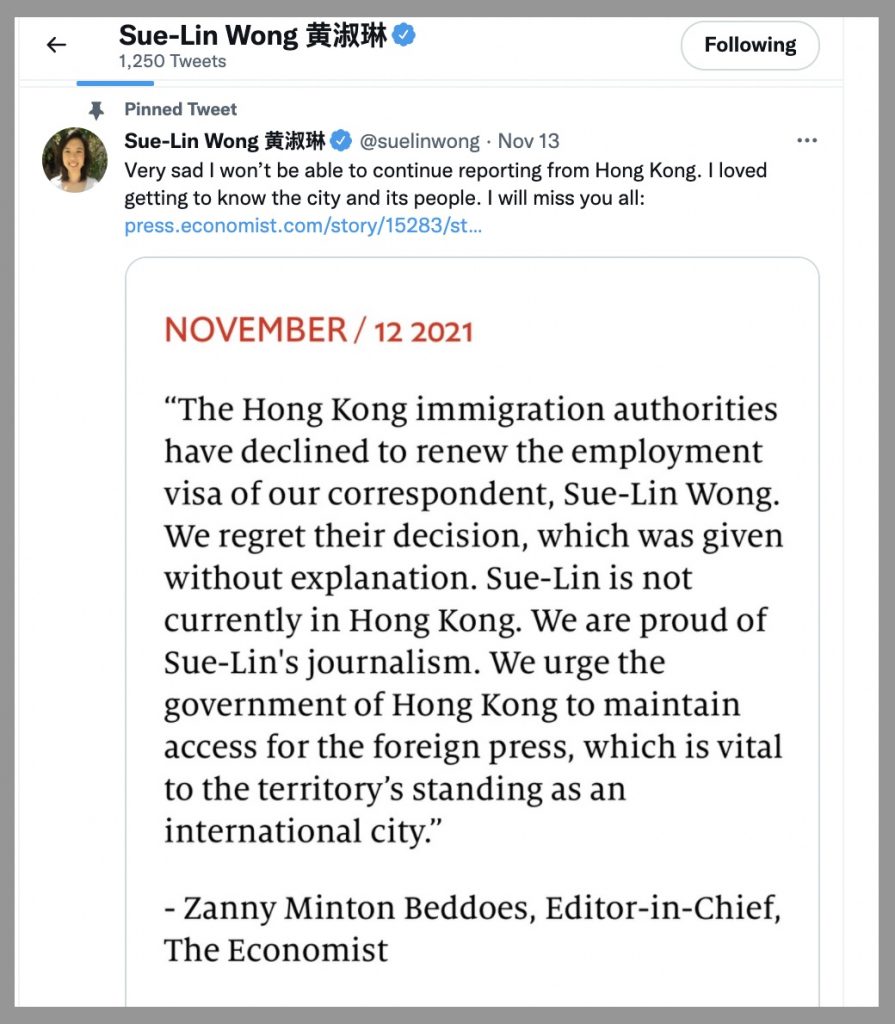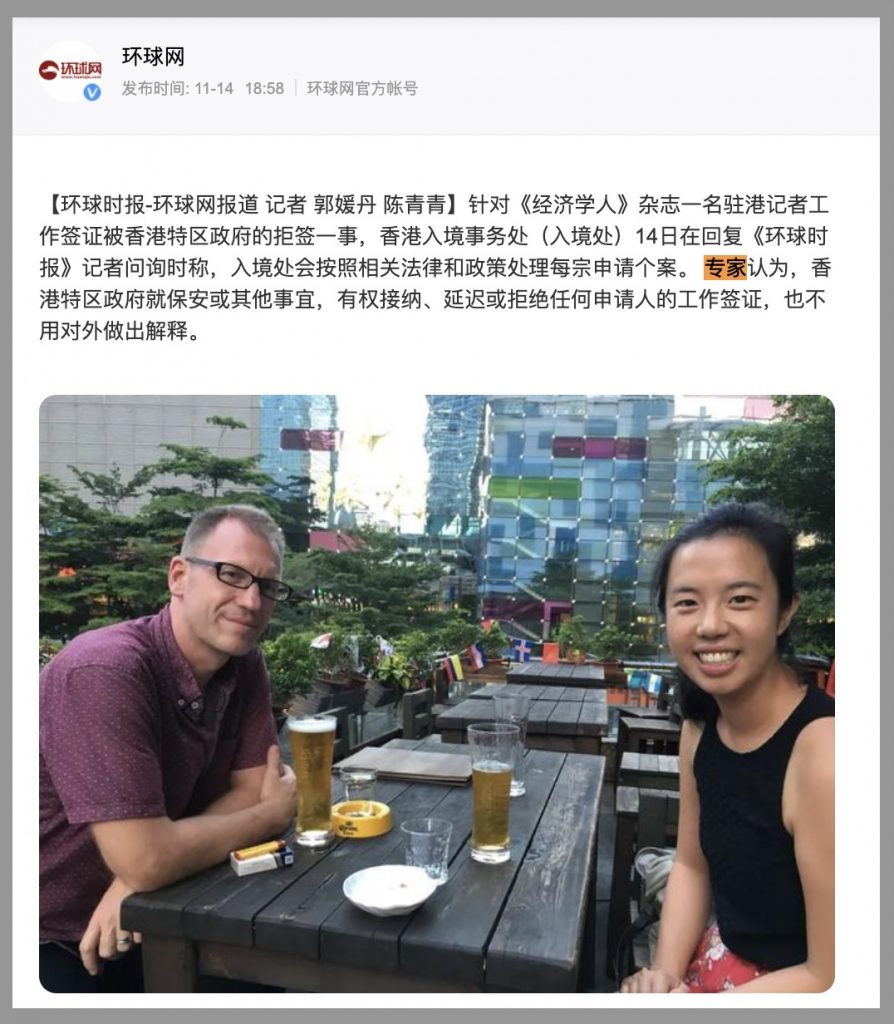
In a statement on November 12, The Economist’s editor-in-chief, Zanny Minton Beddoes, issued a statement revealing that the magazine’s Hong Kong correspondent, Sue-Lin Wong (黄淑琳), had been denied a visa for work in the city. “We regret their decision, which was given without explanation,” Beddoes wrote. “We are proud of Sue-Lin’s journalism. We urge the government of Hong Kong to maintain access for the foreign press, which is vital to the territory’s standing as an international city.”
On November 13, Wong Tweeted that she would miss reporting from Hong Kong, and that she had “loved getting to know the city and its people.”

In a statement on November 14, the Foreign Correspondent’s Club, Hong Kong, said it was “deeply concerned that another journalist . . . has been denied an employment visa in Hong Kong.” The denial of Wong’s visa without explanation, said the FCC, “further highlights the concerns raised in the FCC’s survey of correspondent and journalist members on the state of press freedom in Hong Kong.”
What have the reactions to the denial of Wong’s visa been inside China? The following rundown offers a taste of related coverage and commentary.
In a post called “Not At All Wrong for Reporter for British Media to Be Denied Visa” (英媒记者被拒签,一点都不冤) on November 14, Guancha Syndicate (观察者网), an online media portal based in Shanghai that capitalizes on nationalist topics (a good dig into its affiliations can be found here), immediately went on the attack, alleging bias in Wong’s reporting on Hong Kong: “So how has Sue-Lin Wong covered Hong Kong issues over the years?”
During the period of the “legislative amendment controversy” in Hong Kong, Sui-Lin Wong worked at the Financial Times. In a series of reports on the “amendment controversy,” she smeared the Hong Kong government’s “crackdown” and the Hong Kong police’s enforcement of the law, and glorified rebellious elements and thugs as a common practice; she ignored the tremendous damage caused by the latter to Hong Kong society and said they are “fighting for democracy.”
The Guancha Syndicate article criticizes Sue-Lin Wong’s reporting back in July on threats to academic freedoms in Hong Kong, a report based on interviews with numerous sources. It then broadly criticizes reporting by the Guardian, the Associated Press and Reuters, suggesting that they “all coincide in throwing out absurd arguments such as the so-called ‘suppression of freedom of speech’ under Hong Kong’s national security law and the “erosion of freedom of the press in Hong Kong.”
In fact, it is not difficult to understand the mentality of the Western media. The entry into force of Hong Kong’s national security law has dealt a serious blow to their Hong Kong-related reports that distort facts and turn black and white. At the November 5 press conference held by China’s Foreign Ministry, a Bloomberg reporter tried to hype the fact that nearly half of the journalists from the Foreign Correspondents’ Association of Hong Kong were considering leaving Hong Kong.
Yesterday, November 15, the Guancha Syndicate article was widely shared across Chinese social media, including by the official news app of the CCP’s flagship People’s Daily.
Also on November 14, the Global Times interviewed several Chinese “experts” for their responses to the denial of Wong’s visa, all expressing the view that “the Hong Kong government has the right to admit, delay or refuse any applicant for a work visa for security or other matters without explanation to the public.” The article suggested that Wong “needed to reflect” on her actions in the past. This in fact was the sense carried in the headline, which read: “Hong Kong’s Immigration Department Does Not Comment on Denial of Visa to Foreign Media Reporter: There is No Need to Explain, the Reporter Needs to Reflect on What [She] Has Done.”

A November 14 article by the Global Times suggests Economist reporter Sue-Lin Wong “must reflect on what [she] has done.”
Who were these “experts” cited by the Global Times? In fact, there was just one. This was Zhu Jiajian (朱家健), identified as executive director of the Hong Kong chapter of the China Council for the Promotion of Peaceful National Reunification (CCPPNR), an organization that was founded by the CCP’s United Front Work Department.
“Hong Kong Courier” (港闻速递), a verified Weibo account with close to 50,000 followers that aggregates Hong Kong-related news, often with a pro-government slant, posted that the Hong Kong government had no need to explain its decision. “Some things need not be said so clearly, and the outside world can guess the message that is implied,” the account wrote.
Perhaps the problem comes from the applicant’s past words and actions not being in line with the scope of work and the nature of the visa in question. She needs to reflect on the things she has done in the past, and the speech she has published.
To slander the Hong Kong government for “violating freedom of speech, freedom of the press and human rights” is alarmist talk, as Western countries also deny visas and entry at the drop of a hat.
“Lone Smoke and Twilight Cicada” (孤烟暮蝉), a well-known “red V” account – a designation given to accounts deemed highly influential – referred to Wong in a Weibo post as an Australian “[Chinese] traitor,” or erguizi (二鬼子), an insult referring to Chinese who sided with Japan during the Second Sino-Japanese War (1937–1945). The post seemed to suggest too that Wong’s publication, the Economist, had departed from an economic focus (a misunderstanding of the magazine’s positioning) to wander into politics:
The editor-in-chief of the Economist, which does not talk about economics, has issued a statement saying that the Hong Kong Immigration Department has refused to renew the work visa of Australian dilettante journalist Sue-Lin Wong, asking the Hong Kong government to remain open to foreign media. This person says she is sad she can’t return to Hong Kong, and before she was a reporter for the Financial Times and Reuters.
The general tenor of the comments proliferating under the “Lone Smoke and Twilight Cicada” post was hateful, ugly and personal – expressing hatred for those of Chinese ancestry who do not unconditionally love the People’s Republic of China, showering it with positivity, and voicing general displeasure with Western media.
“The creation of disinformation is the same everywhere,” one user wrote. “Just like the foreign devils and Chinese traitors who have never been to Xinjiang spend the whole day dissing on our Xinjiang.”
“They were a traitor to start with. They don’t even have Chinese citizenship!” another wrote.
“I’m happy this piece of garbage has been thrown away!”
“This person is an anti-China journalist. Eight out of 10 of her articles blackens China, spreads rumors and speculates. What is this pretense of sadness!”
“Sad is exactly how she deserves to feel!”
“Go back home and weave stories there!”




















